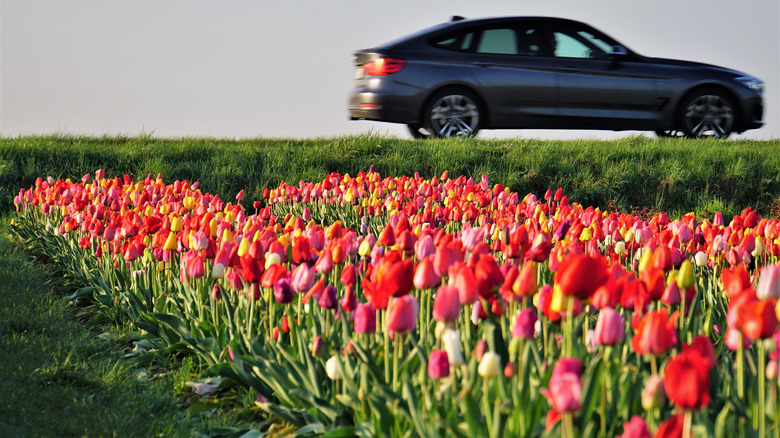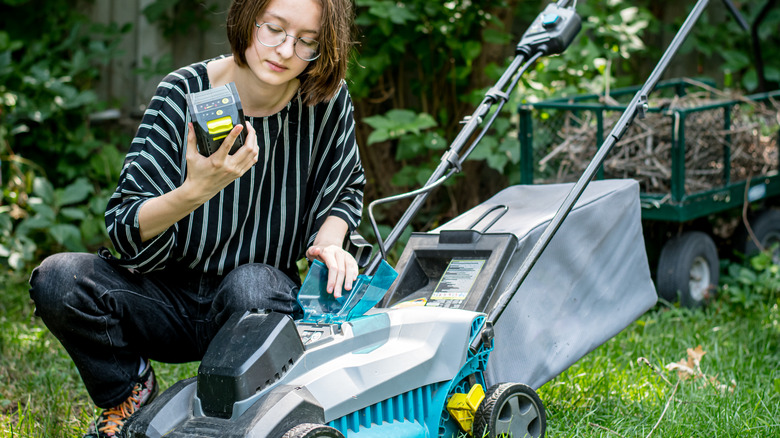Why The Flowers In Your Garden May Soon Lose Their Fragrance
Whether you grew up in a busy city or a quiet country town, the outdoors and nature likely played a key role in memories of your youth. Because scent is so strongly connected to memory, you might think back fondly and remember running through fresh clover fields or catching whiffs of rose, honeysuckle, gardenia, or orange blossom on the breeze. As an adult, you may still enjoy the scent of flowers in the breeze, but if it seems like spring and summer just don't smell as sweet as they used to, you could be absolutely right. Even if you try to plant flower varieties that will make your garden smell heavenly, you might end up with lackluster results to no fault of your own. According to a recent study in Science, nitrate radicals produced by burning fossil fuels are weakening flowers' scent reach, leading to less fragrant summers and possibly fewer blooms in the future.
It may come as no surprise to hear that man-made pollution is continuing to have an effect on the environment, but the idea of flowers actually losing their scent is shocking. Here's why we can't seem to stop and smell the roses like we once did, the consequences for pollinators, and actions you can take to support your garden and the environment.
Nitrate emissions are destroying sweet scents
Flowering plants produce oils in their petals, which evaporate into the air as volatile organic compounds (VOCs). When these VOCs collide with you or a bee's olfactory system, you can perceive the scent of the flower, but airborne compounds created by burning fossil fuels are now degrading VOCs and reducing their attractiveness before they can reach their target. The worst effects were caused by NO3, otherwise known as nitrate radicals. NO3 is a highly unstable molecule that reacts rapidly reacts with and oxidizes other molecules, including those responsible for scent. The effects of NO3 were found to be more severe in urban areas and at night when sunlight wasn't available to help break down NO3.
It's sad enough that flowers aren't as fragrant as they once were, but what does this mean for pollinators? "The NO3 is really reducing a flower's 'reach' — how far its scent can travel and attract a pollinator before it gets broken down and is undetectable," explains University of Washington researcher Jeff Richell (via UW News). Because flowers had significantly less scent reach in the evenings and at night when NO3 is strongest, nocturnal pollinators like moths and bats could be particularly affected. In the study, hawkmoths were less likely to visit flowers whose scent was weakened by NO3. The moths struggled to locate the food sources, and in turn, these plants wouldn't be pollinated or produce seeds and fruit.
Supporting your garden and the planet
To help local pollinators and support biodiversity, you can continue to grow fragrant blooms, especially native plants and stunning plants that bloom at night, like evening primrose, night-blooming jessamine, or Queen of Night cactus. Avoid using pesticides or chemicals that could harm pollinators or cloud their sense of smell. Colorful blooms may also help pollinators locate flowers with more than just smell; purple and blue are some favorites of bees, while butterflies prefer orange, red, yellow, pink, and purple flowers.
With so much research discovering the detrimental effects of fossil fuels and greenhouse gases, it's easy to feel overwhelmed or worry that your personal actions won't have much impact on the environment as a whole. However, you can make strides toward a better world — or at least, a healthier garden. If possible, reconsider gas versus battery-powered lawnmowers and which is right for you. Gas-powered garden equipment emits up to 5% of the nation's total air pollution, and mowing the lawn for just one hour produces as many pollutants as driving a car for 45 miles (via the New Hampshire Department of Environmental Services). Not to mention, you're pumping all that engine exhaust directly into your garden, which could impact flower scents. Lastly, practice greener habits in your day-to-day life and contact your local representatives about policies that affect the planet.


